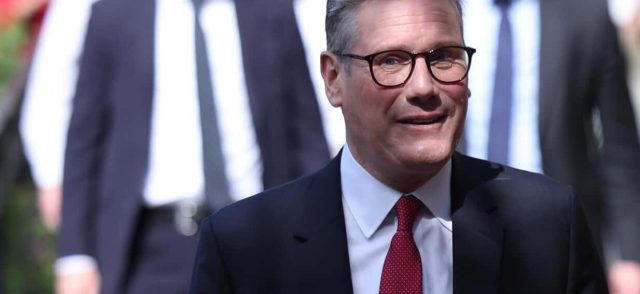UK Labour leader Keir Starmer says he grew up working class — a self-prescribed label that has been a pillar of his .
“My dad was a tool-maker so he worked in a factory and my mum was a nurse, but she was also sadly very ill so she couldn’t work for very long,” Starmer says in one campaign video.
“It was tough going at times and one of the things that helps me in the cost-of-living crisis we’re going through now is knowing what it’s like to make ends meet … in our case, our phone was cut off.”
In , drawing focus to his working-class roots has set Keir Starmer apart from his .
Keir Starmer is promising to boost the economy and public services, but analysts say he’s unlikely to hail a new progressive era in British politics.
Professor Tim Bale from Queen Mary University of London said Starmer is “very much on the centre left”.
“He is quite stiff, quite awkward, and not a sparkling speaker by any stretch of the imagination … [but] given the turmoil that Brits have had to endure since the Brexit referendum in 2016, a bit of boring wouldn’t go down that badly.”
What did Keir Starmer do before politics?
Starmer was born in south London in 1962 and raised in Surrey in England’s southeast.
He was one of four children and was educated in a selective state school, which became private during his time there.
The first in his family to go to university, he studied law at the University of Leeds and Oxford, before starting his career as a criminal defence barrister specialising in international human rights.
Along with Australian barrister Geoffrey Robertson AO, Starmer was a founding member of Doughty Street Chambers, which now boasts notable members including human rights barristers Amal Clooney and Julian Assange’s legal counsel Jennifer Robinson.
He worked on several high-profile cases, championing free speech, working to abolish the death penalty in the Caribbean, and speaking publicly about making the legal system more accessible.
“I do think it’s time that the court system became much more of a place where the ordinary person feels they can go … stripping judges and lawyers of their wigs and gowns and making it much more like a GP’s health centre,” Starmer said in an interview in 1994.
He spent five years in Northern Ireland, working on truce negotiations that culminated in the 1998 Good Friday Agreement, which ended three decades of violent conflict known as The Troubles.
In 2003, he penned op-eds opposing what he said was the UK’s “unlawful” involvement in the Iraq War and making legal arguments against Tony Blair’s reasoning for entering the conflict.
In 2007, he married Victoria Alexander, a former solicitor who currently works for the National Health Service (NHS) in occupational health.
Why is Keir Starmer called ‘Sir Keir’?
The following year, Starmer took up the post of director of public prosecutions and head of the Crown Prosecution Service.
For services to law and criminal justice, he became Sir Keir Starmer in 2014, appointed Knight Commander of the Order of the Bath (KCB).
Knighthoods are awarded by the monarchy to men who have carried out exemplary national service. The female equivalent is known as a damehood.
Such honours have been awarded to several of Starmer’s predecessors in that role.
Keir Starmer’s political career
In 2015, Starmer was elected as the Labour MP for Holborn and St Pancras.
He was initially asked to contend for the leadership but turned it down citing inexperience. The party leadership instead went to Jeremy Corbyn, who appointed Starmer shadow home secretary.
In 2016, Starmer and several other shadow ministers resigned from their positions after losing faith in Corbyn’s leadership over Brexit.
Corbyn was re-elected leader and appointed Starmer shadow Brexit secretary.
In 2020 Labour suffered its worst defeat at a general election since 1935, which forced Jeremy Corbyn’s resignation.
What are his policies?
Despite his socialist-leaning background, Starmer has faced criticism of bringing Labour’s policies too far to the right since he assumed party leadership.
Many have called him ‘a red Tory’ for sidelining or ‘purging’ more progressive or ‘hard left’ members of the party, including Corbyn.
“A lot of people on the left will accuse him of, you know, letting them down, betraying socialist principles, if you like. And a lot of people on the right, accuse him of flip-flopping,” Bale said.
The Starmer campaign has touted five ‘missions’ to rebuild Britain, which include economic growth, investing in clean energy, addressing violent crime, breaking down class ceilings for young people and improving the NHS.
With additional reporting from Australian Associated Press.




